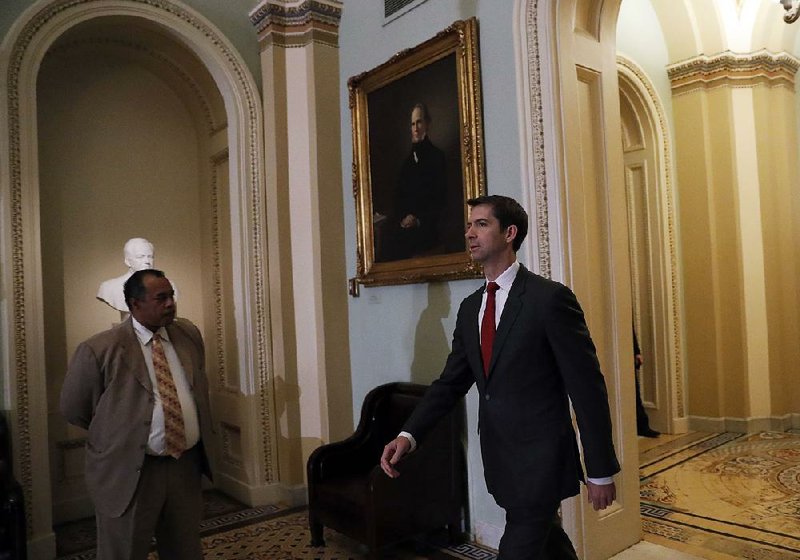WASHINGTON -- The two people most frequently mentioned to head the Pentagon in Donald Trump's administration are both senators -- and some of their chamber's most hawkish Republicans.
RELATED ARTICLES
http://www.arkansas…">Trump denies turmoil bogs his transitionhttp://www.arkansas…">Aide: Media access work in progress
They are Alabama's Jeff Sessions -- one of Trump's closest allies and a top booster since the start of his campaign -- and Arkansas' Tom Cotton, an Army veteran who served in Iraq and Afghanistan and, at 39, the youngest member of the Senate.
Their colleagues are, at this point, used to their stances on national security, such as Cotton's recent argument that waterboarding isn't torture. Sessions also recently voted against anti-torture legislation, which puts both in line with Trump, who backs the use of waterboarding and "much worse" as interrogation techniques.
But if Trump goes with Sessions, Washington Republicans could be in for a rude awakening: Sessions has long campaigned for smaller federal budgets and favors keeping as a ceiling the overall budget caps that Congress almost surely must lift in order to approve the defense ramp-up that Trump promised during his campaign.
[TRUMP: Timeline of president-elect’s career + list of appointments so far]
Defense hawks in Congress say they are certain that with Cotton, they could raise spending to the levels they have been clamoring for. With Sessions, they aren't quite so sure.
"Tom Cotton is all in for more defense spending," Sen. Lindsey Graham, R-S.C., who said he would vote for either pick, told reporters Tuesday. "Jeff Sessions, I think, supports more defense spending, but he's been more of a deficit hawk."
Senate Armed Services Committee Chairman John McCain, R-Ariz., commented, "I have no thoughts about any of the appointees of the president. That's his prerogative."
If the Pentagon's new head comes from McCain's peers, the move would not be unprecedented: President Bill Clinton's Defense Secretary William Cohen, R-Maine, served on that panel before joining the administration, and President Barack Obama's former Pentagon chief Chuck Hagel, R-Neb., had served on the Senate Foreign Relations Committee.
Both Sessions and Cotton are Armed Services Committee members. Sessions, who will turn 70 next month, has far more seniority than Cotton, who would be one of the youngest-ever secretaries of defense if selected.
Both have military experience, though Cotton's is more recent and perhaps more relevant: He spent four years on active duty, the bulk of it in the Army's 101st Airborne Division, which included seeing combat during deployments to Iraq and Afghanistan, before joining the Army Reserve for another four years. Sessions was in the Army Reserve from 1973 to 1986.
But neither of the two has significant executive experience running an operation anywhere near as large as the Pentagon, where they would be in charge of more than 25,000 employees on-site, not to mention the nearly 2 million additional members of the armed services and reserves, and a budget that constitutes about a sixth of all federal spending.
The next secretary of defense will have to manage that operation during a period of significant changes, as Trump and his advisers have promised a spike in military spending.
They propose a significant increase in the size of the Army, going from about 450,000 to 550,000, close Trump confidant Rudy Giuliani said over the weekend. They also want a rise in the number of naval warships to 350, from the approximately 275 currently in service. Trump pledges to invest more in cyber defenses, and GOP leaders are looking to him to modernize the nuclear arsenal and pursue an expansion of missile defense. Not to mention pay for keeping up the fight against the Islamic State and other radical groups abroad.
In either candidate, Trump would inherit one of the Senate GOP's most unabashed iconoclasts: Both have been willing to vote and embrace hawkish stances that Democrats and even some Republicans have criticized as extreme. Both, for example, are opposed to women serving in infantry roles, and to recent efforts to require women to register for the Selective Service.
Cotton made a name for himself soon after arriving in Washington by penning a letter to the ayatollah of Iran disputing the Obama administration's right to engage in negotiations over the Iran nuclear deal -- a deal Trump has called "terrible" -- and pulling almost all Senate Republicans on board. Sessions, meanwhile, is renowned for being one of Congress' most uncompromising voices on immigration enforcement, which fits in well with the president-elect's plans to build a southern border wall.
Both Cotton and Sessions believe that the United States should have kept more troops in Iraq, and agree with Trump that waterboarding should be an available tool to U.S. interrogators, a stance considerably more hawkish than that held by most members of Congress.
Sessions' and Cotton's offices did not respond to requests to comment, but fellow Alabama Republican and Sessions friend Mo Brooks agreed with the idea that any increased money for defense should be compensated for elsewhere in the budget.
A Section on 11/17/2016

